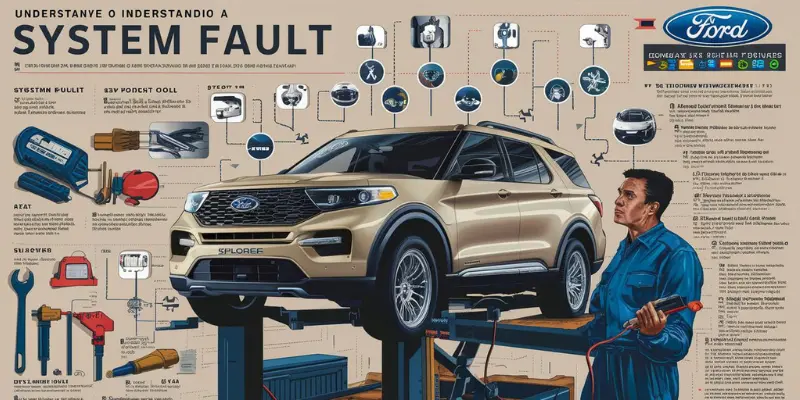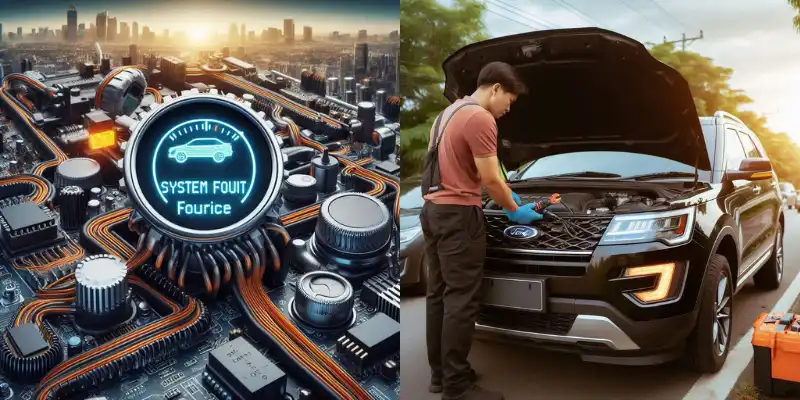What Does System Fault Mean on a Ford Explorer? Causes and Fixes
Updated: August 13, 2024
155
Seeing the words “System Fault” on your Ford Explorer’s dashboard can be really upsetting. It’s like your car is trying to tell you something is wrong, but it’s not speaking your language. There are many reasons a car loses all electrical power. Don’t panic!
This guide will explain what this error message means, why it happens, and how to fix it. Whether you’re a car expert or someone who wants to keep your Explorer running smoothly, we’ve got you covered. Let’s figure out this problem together.
Overview of the Ford Explorer
Evolution of the Ford Explorer Over the Years
The Ford Explorer is a popular big car that people like to drive. It started a long time ago and has changed a lot since then.
At first, it was built for driving on rough roads, but now it’s more comfortable and good for families and people who like to go on adventures. It’s gotten bigger and better over the years, with new things inside and better safety stuff.
So, the Explorer has gone from being a tough car for off-road to a nice car that’s good for everything.

How the Ford Explorer Has Evolved
Older Explorers were pretty simple cars. But now, they have special engines that save gas, cool ways to help you drive in different weather, and many safety helpers. You can even use your phone in the car and see things on a big screen.
It’s like the Explorer has a really big brain now!
What Does System Fault Mean
A system fault in a vehicle refers to any error or malfunction detected by the vehicle’s onboard computer system. Modern vehicles are equipped with numerous electronic control units (ECUs) that monitor and manage various systems, such as the engine, transmission, brakes, and more. When these systems detect an issue, they send a signal to the ECU, which then triggers a warning light or message on the vehicle’s dashboard.
If you’re experiencing a System Fault message in your Ford vehicle, it could be related to a more serious issue like the Ford Sync Black Screen of Death.
Types of System Faults
System faults in vehicles can be broadly categorized into three main types:
| Type of System Fault | Description | Potential Impact |
|---|---|---|
| Electrical System Faults | Electrical system faults occur when there is a problem with the vehicle’s electrical circuits or components. These can include issues with the battery, alternator, wiring, or sensors. | Can affect vehicle performance, may cause unpredictable behavior, or prevent the vehicle from starting. |
| Mechanical System Faults | Mechanical system faults refer to problems with the physical components of the vehicle, such as the engine, transmission, suspension, or brakes. These might be due to wear and tear, poor maintenance, or damage. | Can lead to reduced performance, unusual noises, or complete breakdowns. |
| Software or Firmware Faults | Software or firmware faults occur when there is a glitch or error in the vehicle’s programming. These can result from corrupted data, failed updates, or bugs in the system code. | Can cause incorrect sensor readings, failure of electronic components, or prevent the vehicle from starting, requiring updates or reprogramming. |
Common Symptoms of a System Fault
1. Warning Lights:
Common dashboard lights that accompany system faults include:
- Check Engine Light: Indicates issues with the engine or emissions system.
- Battery Light: Points to electrical problems, often related to the battery or alternator.
- ABS Light: Signals a problem with the Anti-lock Braking System.
- Transmission Warning Light: Warns of potential transmission issues.
2. Performance Issues:
System faults can affect vehicle performance in several ways:
- Reduced Power: The vehicle may feel sluggish or unresponsive.
- Poor Fuel Efficiency: You might notice increased fuel consumption.
- Stalling: The engine may stall unexpectedly.
- Difficulty in Starting: The vehicle may take longer or fail to start entirely.
3. Unusual Noises:
Sounds that might indicate a system fault include:
- Grinding or Squealing: Often associated with mechanical faults, particularly in the brakes or transmission.
- Knocking or Pinging: This may indicate engine problems, such as timing or fuel system issues.
- Humming or Whining: This could be related to electrical issues, such as a failing alternator.
- Clicking: This might signal an issue with the starter motor or a loose electrical connection.
“Ignoring a ‘System Fault’ message is like ignoring a fire alarm—it may seem small at first, but the consequences can be serious.”David Brown, Author of ‘The Essential Guide to Car Maintenance’
4. Other Signs:
Additional signs that could point to a system fault include:
- Strange Smells: Burning smells or the scent of gasoline could indicate a fault.
- Fluid Leaks: Unexplained leaks under the vehicle might point to mechanical issues.
- Erratic Shifting: Inconsistent gear shifts can be a sign of transmission problems.
- Vibrations: Unusual vibrations, especially when accelerating or braking, may signal underlying faults.
Causes of System Faults in Ford Explorer
| Failure Causes of System Faults |
|---|
|
Diagnosing System Faults in a Ford Explorer
- Using OBD-II Scanner
- Professional Diagnosis
- Common Diagnostic Tools
- DIY Troubleshooting

Impact of System Faults on Vehicle Performance
| Impact of System Faults on Vehicle Performance | Description |
|---|---|
| Fuel Efficiency | If your car has problems, it can use more gas. This makes the engine work harder and not be as good at saving gas. You will have to fill up your car more often and spend more money on gas. |
| Engine Performance | Problems with your car can make the engine work badly. This can mean less power, the engine missing, the car stopping suddenly, or even the engine breaking completely if it’s really bad. |
| Safety Concerns | Not fixing car problems can be really dangerous. Things like your brakes not working, the steering going wrong, or the car suddenly stopping can happen. This makes it more likely to have a crash. |
| Long-Term Damage | If you don’t fix problems with your car, it can break other important parts. Repairing and making your car wear out faster can cost a lot of money. |
Preventive Measures of System Fault in Ford Explorer
| Safety Tips |
|---|
|
Conclusion
A “System Fault” message on your Ford Explorer warns that something isn’t working correctly. While it can be concerning, many issues causing this message are not serious and can be resolved easily. By staying calm, following the steps outlined above, and ensuring regular maintenance, you can keep your Ford Explorer running smoothly.
A system fault in your vehicle can sometimes cause unexpected issues, such as your windshield fogging up. Remember, if you’re ever in doubt, it’s always best to consult with a professional mechanic. They can provide the exact diagnosis and keep your vehicle safe on the road.
FAQs
Can a system fault cause my Ford Explorer to break down?
Yes, depending on the severity of the fault, it can cause your car to break down.
Can I fix a system fault myself?
Some minor faults can be fixed by yourself, but most require professional help.
How do I know if my Ford Explorer has a system fault?
Your Ford Explorer will usually have a warning light on the dashboard if there’s a problem. You might also notice strange noises, smells, or changes in how the car drives.
What causes system faults in a Ford Explorer?
System faults can be caused by many things, including worn-out parts, electrical problems, or software glitches.
What is a system fault in a Ford Explorer?
A system fault is a problem with one or more of your Ford Explorer’s systems. This could be anything from the engine to the brakes.
Please Write Your Comments